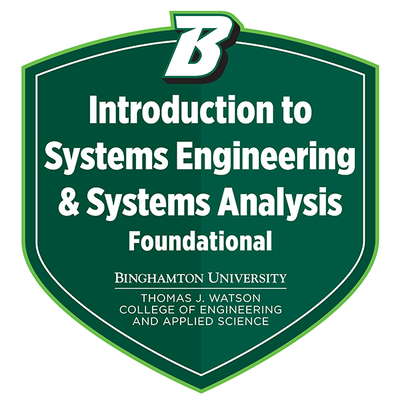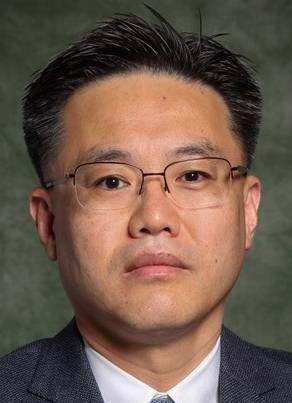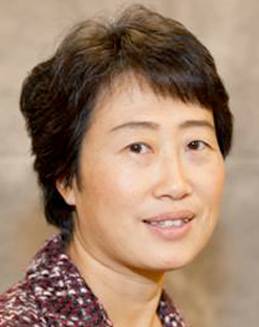Introduction to Systems Engineering
& Systems Analysis
- Instructor: Sangwon Yoon, Nagendra N. Nagarur, and Shuxia Lu, Systems Science and Industrial Engineering (SSIE) Department at Binghamton University.
- Open year-round
- Delivery: Self-paced online. The course consists of video lectures, accompanied by self-assessment quizzes (ungraded), and a final multiple-choice exam (graded).
- Credentials: Introduction to Systems Engineering and Systems Analysis digital badge and a Binghamton University course completion certificate.
- Who can take this course: This course is open to all engineers, professionals, faculty, and students.
- If you have any questions, please reach out to wtsnindy@binghamton.edu
COURSE DESCRIPTION

In today’s complex world, the vast availability and wide use of systems is rapidly becoming the underpinning of our modern society. Our world is composed of numerous complex systems that are becoming increasingly intricate.
A system can be a complex computer system performing billions of operations per second, or a healthcare delivery system providing critical care services to thousands of patients each year.
Applying sound systems engineering and analysis methods helps us better relate to the systems around us, and more importantly, helps us to design or redesign systems, processes, and practices that allow them to operate more efficiently and effectively from an end-user perspective. This course offers a variety of important Systems Engineering concepts from system design and deployment to field performance and reliability.
Course Duration - 7 to 10 hours
LEARNING OBJECTIVES
At the successful completion of this course, the participants will be able to:
- Define a system and discuss key systems engineering concepts
- Describe and construct a “House of Quality” for a system using Quality Functional Deployment (QFD)
- Explain the several different approaches to systems engineering and systems lifecycle models, their applications, and benefits.
- Identify the key stakeholders when designing or analyzing a system
- Use a RACI matrix to help manage key stakeholders during system design, development, delivery, and analysis
- Apply Voice of Customer (VoC) and Voice of Process (VoP) to help define system functional and performance requirements
- Explain and analyze system reliability using various configurations and models
- Describe Total Production Maintenance (TPM) and its benefits in improving system reliability (MTTF, MTTR)
TOPICS
- Session 1: Systems Engineering, House of Quality
What is a System, Elements of System, Relation between System and Subsystem, Systems Engineering, Approaches of System Engineering, Lifecycle of System, System Design and Feasibility Analysis, System Operational Requirements, House of Quality, Correlation Matrix and Competitive Assessment, Implementation of Systems Engineering, Systems Engineering Application Domain, Potential Benefits of Systems Engineering
- Session 2: Stakeholder Analysis- RACI Matrix, VOC & VOP
Role of the Stakeholder, Benefits of Stakeholder Analysis, BABOK – tool, RACI Matrix and Benefits, Understanding Customer Requirements, Voice of Customer and Voice of Product (VOC & VOP), Business Problem Solving, Deming Cycle
- Session 3: Reliability, Total Productive Maintenance
Reliability, Maintainability, Availability, Typical Failure Rate Curve (bathtub), Constant Failure Rate Model (CFR), Time Dependent Failure Models, Weibull Distribution, Failure Data Collection and Analysis, Censoring of Data
ABOUT THE INSTRUCTORS

Sangwon Yoon
Professor
School of Systems Science and Industrial Engineering
yoons@binghamton.edu
607-777-5935
EB S08
Background
Education
- PhD, Purdue University
- MS, Korea University
- BS, Jeonbuk National University
Research Interests
- Decentralized decision modeling
- Realtime control in smart manufacturing
- Large-scale data mining optimization

Nagendra N. Nagarur
Professor
School of Systems Science and Industrial Engineering
nnagarur@binghamton.edu
EB S05
Background
Education
- MS, Wichita State University
- PhD, Virginia Polytechnic Institute and State University
Research Interests
- Supply chain modeling
- Reliability of micro electronic components
- Quality control

Shuxia (Susan) Lu
Professor
School of Systems Science and Industrial Engineering
slu@binghamton.edu
607-777-4908
EB R08
Background
Education
- BS, Hebei University of Technology
- MS, Tianjin University
- PhD, Texas Tech University
Research Interests
- Reliability
- Statistical process control
- Information technology
- Computer integrated manufacturing
COURSE FEES
- $250: Standard/Industry rate
- $225: Standard/Industry group rate (3-5 people from the same organization). Contact wtsnindy@binghamton.edu to register your group.
- $150: BU or SUNY Faculty and Staff, BU alumni graduated May 2020 or prior, and non-SUNY students
- $105: Non-BU/SUNY students (must give evidence of matriculation at University/College)
- $95: BU or SUNY students, recent BU alumni (graduated in Dec. 2020 or later), high school students
PAYMENTS
Payment is required at the time of registration.
If you are not able to pay with a credit card, you can contact us at wtsnindy@binghamton.edu to make arrangements for a check payment.
CANCELLATIONS AND REFUNDS
Please note our cancellation and refund policy: All cancellations must be received in writing (email) to the Office of Industrial Outreach. All refunds will be assessed a 10% administrative fee. No refunds for cancellations or non-attendance will be given after you have started the course. Submit your cancellation request to EMAIL: wtsnindy@binghamton.edu.
If the course is canceled, enrollees will be advised and receive a full refund.